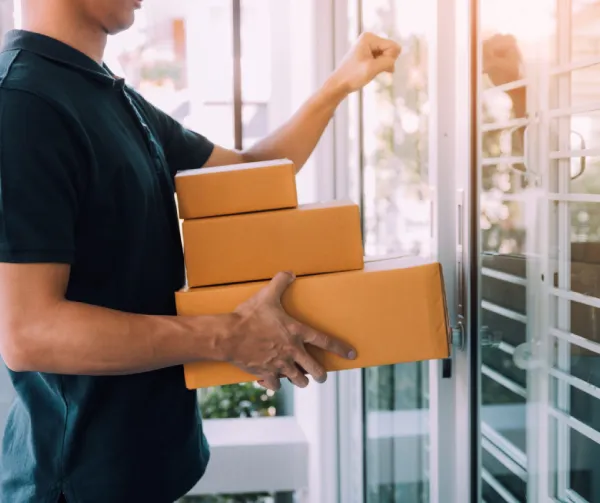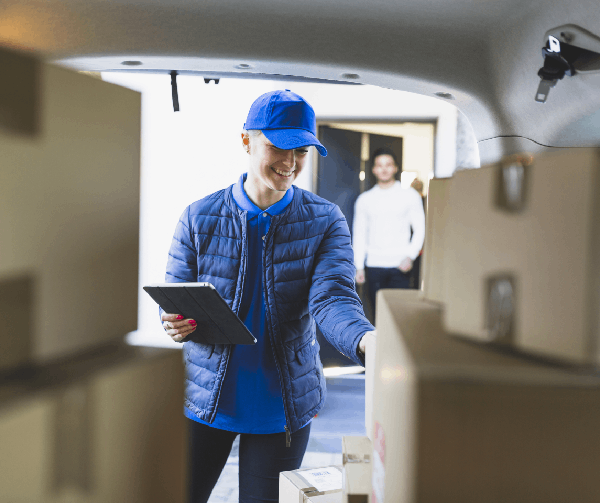
Cracking the Power of Packaging for Parcel Companies: Boosting Product Appeal and Customer Satisfaction
The manner in which you package your product is of great significance in the competitive marketplace of today. This can affect how much people believe your product is worth. Surprisingly, despite the fact that technological advancements continue to be made, the manner in which we package things has not changed significantly. The many packaging choices that are used by standard delivery services in LA and parcel companies are discussed in this blog. Every single one of them is intended to enhance the quality of your product and to provide your clients with a more satisfying experience.
1.Paperboard Boxes
Paperboard is like thick paper that’s strong but not too heavy. Parcel companies can easily cut it into different shapes and make custom packaging. They make it from wood fibers or recycled paper. There are different types of paperboard, each for different packaging jobs.
- Solid Bleached Sulfate (SBS) Paperboard: Great for things like cosmetics, medicines, milk, juice, and frozen food.
- Kraft or Coated Unbleached Kraft (CUK) Paperboard: This one looks more natural and eco-friendly. It’s good for similar things but not so great for stuff that can get wet.
With the right design, paperboard can look fancy without costing a lot.
2. Corrugated Boxes
Corrugated boxes are what most people call “cardboard.” But there’s more to them than meets the eye. They come in different types, depending on how tough they are. What makes them strong is their corrugated middle layer.
These boxes are usually made from recycled paper and can be used again and again. You’ll find them in shipping, as well as pizza boxes and small product packaging.
3. Plastic Boxes
Plastic, a remarkably versatile material, has revolutionized various industries. From spaceships to everyday paperclips, plastic has replaced traditional materials such as wood, glass, and ceramics. Plastic boxes, in particular, have garnered widespread use due to their inherent advantages. Moreover, plastic is known for its recyclability, durability, and preservation capabilities, making it an ideal choice for various packaging needs. In addition, its transparent nature allows for product visibility without the need to open the package. Furthermore, plastic packaging does not easily break and can withstand extreme conditions, making it a reliable choice for a diverse range of products.
4. Rigid Boxes
You might have wondered what kind of box holds iPhones or high-end products like Rolex watches. They’re not just regular cardboard; they’re rigid boxes. These boxes are made from super thick paperboard, four times thicker than the stuff used for regular boxes.
Rigid boxes look great but cost more. They’re often handmade and don’t fold flat. They’re used for luxury items like cosmetics, jewelry, tech gadgets, and high-end fashion.
5. Chipboard Packaging
Chipboard packaging is used in many industries, from electronics to food. It’s made from recycled paper and can be cut, folded, and shaped easily. Chipboard comes in different strengths, depending on how dense it is. If parcel companies want to print on chipboard, they can treat it to make it tougher.
Chipboard is great for lightweight items, but it’s not suitable for heavy stuff or places with lots of moisture.
6. Poly Bags
These versatile packaging solutions are manufactured from a flexible and thin plastic film fabric. What sets poly bags apart is their adaptability across a wide range of products, making them a go-to choice for various industries.
Moreover, poly bags combine durability with lightweight properties, making them an efficient choice for packaging needs. Additionally, they are reusable, which adds to their appeal, allowing customers to find a second purpose for these bags.
Furthermore, the flexibility of poly bags extends to customization. Businesses can design these bags to fit their unique requirements in terms of design, style, and size. This flexibility doesn’t come at a high cost, as poly bags remain cost-effective despite their customization potential.
7. Foil Sealed Bags
Transitioning from conventional packaging to foil-sealed bags can revolutionize your product’s shelf life and freshness. Foil-sealed bags are a game-changer, particularly in preserving the quality of food products. Moreover, they extend the shelf life of various items. These bags excel in oxygen removal, which prevents bacterial growth and keeps flavors intact.
Notably, their applications go beyond just food. Foil-sealed bags are trusted for packaging bedding, clothing, and other delicate items. The process involves removing oxygen from the bag to secure fabrics, preventing fungal growth. Additionally, nuts, cereals, smoked fish, cheese, and cured meats find refuge in foil-sealed bags, shielding them from spoilage.
10 Tips for Better Packaging
1. Choose the Right Stuff
Picking the right materials for packaging is vital for parcel companies. Not all packages are created equal, and materials should match your product’s unique characteristics. For fragile items, consider cushioning materials like bubble wrap. For heavier objects, use sturdy boxes and secure padding. Ensuring your packaging materials suit your product keeps it safe during its journey to the customer.
2. Think About Your Product
Each product is different, and its packaging should reflect that. Delicate items need layers of protection, like multiple layers of bubble wrap. For heavy objects, opt for polystyrene blocks to prevent damage. Keep valuable items secure and ensure they don’t move around inside the box during shipping. Tailoring your packaging to your product’s specific needs minimizes the risk of damage.
3. Don’t Leave Empty Spaces
Empty spaces inside your packaging can be problematic. Items can shift, bump into each other, and get damaged during transit. To prevent this, fill those empty spaces with materials like bubble wrap, polystyrene chips, or shredded paper. Parcel companies ensure proper cushioning is in place so items remain snug and safe during shipping.
4. Use Strong Materials
Fragile items require sturdy packaging materials. Avoid using soft paper, fabric, or cloth for parcel delivery that can easily get damaged by sharp edges on other packages. Sturdy packaging helps protect your goods throughout the shipping process, ensuring they reach their destination in good condition.
5. Reuse Smartly
Reusing old boxes can be a cost-effective choice, but ensure they’re still strong and in good condition. Damaged boxes may compromise the protection of your items. Additionally, cover or remove old labels to prevent confusion about the package’s destination.
6. Label Clearly
Clear labeling is crucial. Place labels where they’re easy to spot, without any tape covering them. Ensure labels are easy to read and understand. For items that are heavy, fragile, or potentially hazardous, provide clear and accurate labeling to prevent mishandling during transit.
7. Give Info
When booking shipping services, provide complete and accurate information about your item. Properly label the contents to ensure compliance with shipping regulations and guidelines. Accurate information helps carriers handle your package correctly, reducing the risk of damage.
8. Don’t Overdo Wrapping
While wrapping can be visually appealing, excessive wrapping can lead to damage during transit. Fragile wrapping paper and ribbons can tear easily. This increases the likelihood of your package arriving in poor condition. Use sufficient but not excessive wrapping to protect your items.
9. Check the Rules
Not all items are allowed to be shipped, and some may have restrictions or regulations. Ensure your items comply with shipping regulations and guidelines to avoid issues during transit. Contact your shipping provider for a list of prohibited items to ensure smooth shipping.
10. Ask for Help
If you’re uncertain about the packaging or contents of your package, seek advice from shipping professionals or experts. They can guide the best packaging practices for your specific items, ensuring they arrive safely at their destination. When in doubt, consulting with professionals can save you from potential shipping mishaps.
LA Courier Services Company: Your Reliable Shipping Partner for Reliable Parcel Delivery
Our mission is simple: to provide you with a courier experience that exceeds your expectations. With a team of dedicated professionals and a fleet of reliable vehicles, we ensure that your packages reach their destination promptly and safely. Whether you’re a business seeking dependable logistics solutions or an individual with urgent shipping requirements, we’ve got you covered. Trust in our expertise, efficiency, and commitment to customer satisfaction.
Join the countless satisfied clients who have made us their preferred courier service in Los Angeles. Experience the difference with LA Courier Services Company today! Ready to elevate your shipping experience? Contact us now and discover the convenience of seamless parcel delivery. Your satisfaction is our priority, and we’re just a call away from meeting your courier needs with excellence.
FAQs
To maximize the chances of your package arriving safely, choose suitable materials, provide adequate cushioning, and fill empty spaces to prevent movement during transit. Proper labeling and adherence to shipping regulations are also essential.
Share this:
news
Related Articles


Last-Mile Delivery: What is It and How to Beat Your Competition

